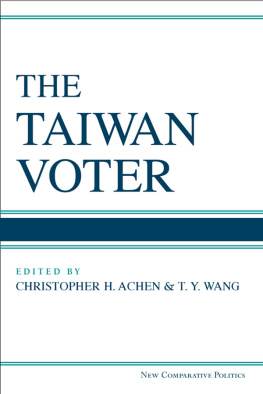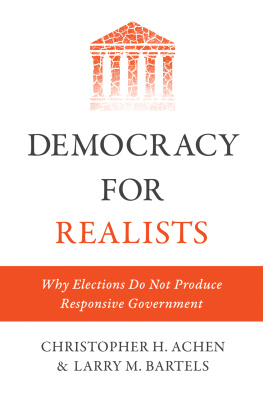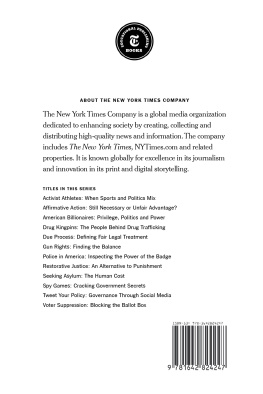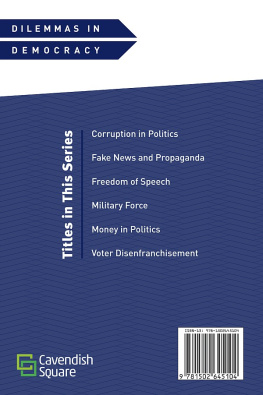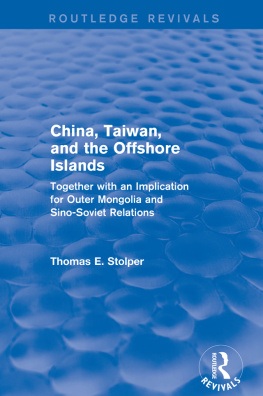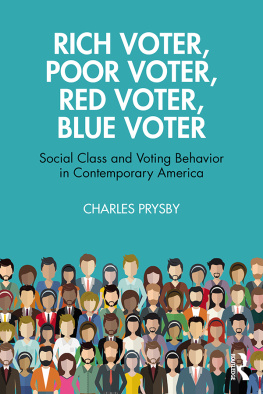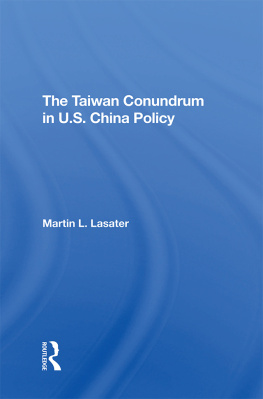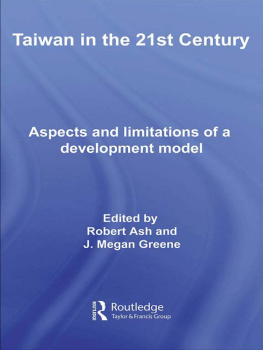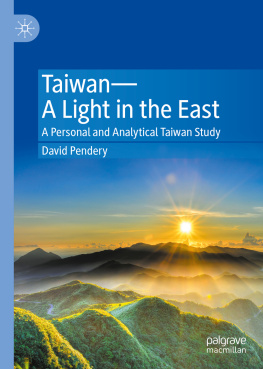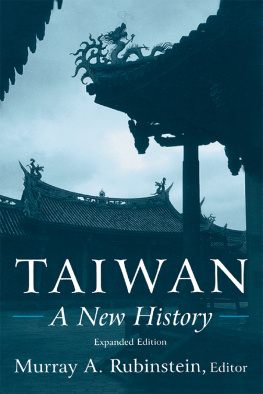Christopher H. Achen - The Taiwan Voter
Here you can read online Christopher H. Achen - The Taiwan Voter full text of the book (entire story) in english for free. Download pdf and epub, get meaning, cover and reviews about this ebook. year: 2018, publisher: University of Michigan Press, genre: Politics. Description of the work, (preface) as well as reviews are available. Best literature library LitArk.com created for fans of good reading and offers a wide selection of genres:
Romance novel
Science fiction
Adventure
Detective
Science
History
Home and family
Prose
Art
Politics
Computer
Non-fiction
Religion
Business
Children
Humor
Choose a favorite category and find really read worthwhile books. Enjoy immersion in the world of imagination, feel the emotions of the characters or learn something new for yourself, make an fascinating discovery.
- Book:The Taiwan Voter
- Author:
- Publisher:University of Michigan Press
- Genre:
- Year:2018
- Rating:4 / 5
- Favourites:Add to favourites
- Your mark:
- 80
- 1
- 2
- 3
- 4
- 5
The Taiwan Voter: summary, description and annotation
We offer to read an annotation, description, summary or preface (depends on what the author of the book "The Taiwan Voter" wrote himself). If you haven't found the necessary information about the book — write in the comments, we will try to find it.
The Taiwan Voter — read online for free the complete book (whole text) full work
Below is the text of the book, divided by pages. System saving the place of the last page read, allows you to conveniently read the book "The Taiwan Voter" online for free, without having to search again every time where you left off. Put a bookmark, and you can go to the page where you finished reading at any time.
Font size:
Interval:
Bookmark:
 Page i
Page i The Taiwan Voter examines the critical role that ethnic and national identities play in politics, illustrated by the case of Taiwan. That countrys elections often raise international tensions, and they have sometimes led to military demonstrations by China, as in the 199596 Taiwan Strait Crisis. Yet no scholarly books have examined the ways in which Taiwans voters make their electoral choices in such a dangerous environment. Critiquing the conventional interpretation of politics as an ideological battle between liberals and conservatives, The Taiwan Voter demonstrates that in Taiwan the party system and the voters response to it are instead shaped by one powerful determinant of national identitythe China factor. The book also takes up Taiwans voter turnout, pocketbook voting, and the effects of the new electoral system adopted in 2004.
Taiwans electoral politics draws international scholarly interest because of the prominence of ethnic and national identification in its politics. Of course, identities matter almost everywhere. In most countries, though, the many tangled strands of competing identities present a daunting challenge for scholarly analysis. Taiwan, by contrast, is a country where the cleavages are both powerful and limited in number, so that the logic of the interrelationships among issues, partisanship, and identity are particularly clear. In this book, Christopher H. Achen and T. Y. Wang bring together experts on Taiwan to investigate the ways in which social identities, policy views, and partisan preferences intersect and influence each other. These novel findings have wide applicability to other countries, and thus they will be of interest to a broad range of social scientists interested in identity politics.
Christopher H. Achen is Professor of Politics and Roger Williams Straus Professor of Social Sciences at Princeton University.
T. Y. Wang is Professor of Politics and Government at Illinois State University.
Page ii Page iiiChristopher H. Achen and T. Y. Wang, editors
University of Michigan Press
Ann Arbor
Page iv Copyright 2017 by Christopher H. Achen and T. Y. Wang
All rights reserved
This book may not be reproduced, in whole or in part, including illustrations, in any form (beyond that copying permitted by Sections 107 and 108 of the U.S. Copyright Law and except by reviewers for the public press), without written permission from the publisher.
Published in the United States of America by the
University of Michigan Press
Manufactured in the United States of America
A CIP catalog record for this book is available from the British Library.
Library of Congress Cataloging-in-Publication data has been applied for.
ISBN: 978-0-472-07353-5 (hardcover : alk paper)
ISBN: 978-0-472-05353-7 (paperback : alk paper)
ISBN: 978-0-472-12303-2 (ebook)
ISBN: 978-0-472-12303-2 (Open Access)
doi: http://dx.doi.org/10.3998/ mpub.9375036
The Open Access edition was funded by the Top University Project of National Chengchi University, made possible by a grant from Taiwans Ministry of Education.
Page v Page viThis book began at a conference in Taipei, Taiwan, on March 24, 2013. The Election Study Center of National Chengchi University hosted all the authors for an intense discussion of how a book about the Taiwan voter might be written. (A few contributors were virtual attendees via an Internet link.) Preliminary versions of chapters were presented and thoroughly discussed. After additional reviews and revisions, this book was accepted for publication by the University of Michigan Press.
The Election Study Center has provided extensive administrative and financial support to this project from the beginning. The book would have been impossible without the research excellence and professional colleagueship of the members of the Center. Their warm hospitality to each editor on multiple occasions has been a highlight of our professional lives.
A great many people and institutions also helped make The Taiwan Voter possible. T. Y. Wangs research sabbatical was funded by the Chiang Ching-kuo Foundation and Taiwans National Science Council (now called the Ministry of Science and Technology). He also received a Summer Faculty Fellowship from Illinois State University to support this project. A grant to Wang from the Taiwan Foundation for Democracy paid for editing and other expenses of preparing the book for publication review. The Open Access edition was funded by the Top University Project of National Chengchi University, made possible by a grant from Taiwans Ministry of Education. Princeton Universitys Politics Department and Illinois State Universitys Department of Politics and Government also helped with logistical support and research funding.
Larry Bartels, during his time as director of Princetons Center for the Study of Democratic Politics, hosted a small conference that helped build a foundation for this book. Michele Epstein and Helene Wood provided the Page viii administrative support to make the conference successful. We thank all three of them.
Achen remembers with respect and gratitude his former colleague Tang Tsou of the University of Chicago Political Science Department, now deceased, who arranged a first visit to Taiwan. The trip was paid for by Taiwans Government Information Office, which was then directed by Dr. Shao Yu-ming. That eye-opening initial encounter with the people of the island led to the professional relationships that have made possible Achens participation in this project.
The anonymous reviewers for the University of Michigan Press gave us two rounds of thoughtful comments and criticism. The book is much better for their efforts. Gail Schmitt and Carissa L. Tudor provided editing assistance, and we are in their debt as well. We also thank our editors at the University of Michigan Press, Melody Herr and Mary Francis, supported by Danielle Coty, for their enthusiasm about our project and for their encouragement and guidance through the publication process. We have also very much appreciated the unwavering support of the series editor, Mic Laver.
To analyze Taiwan voters political attitudes and electoral behavior, the contributors to this volume have utilized multiple waves of survey data, aggregate electoral data, and information gathered through focus group interviews, all collected on the island during the past two decades. Most of the data used in this book are taken from Taiwans Election and Democratization Study (TEDS). This long-running series of representative national samples of Taiwan voters is the gold standard for academic election studies in Asia. The coordinator of the multiyear TEDS project is Chi Huang of the Election Study Center and the Political Science Department at National Chengchi University, Taipei, and the data are managed and distributed by the Election Study Center. More information is available on the TEDS website (http://www.tedsnet.org).
Other data sources for the book include the Taiwan National Security Survey (TNSS), sponsored by the Program in Asian Security Studies under the directorship of Emerson Niou of Duke University, and also a number of individual surveys conducted by the faculty of the Election Study Center, many of whom are contributors to this volume. Focus group interviews conducted by the faculty and staff of the Election Study Center also appear in subsequent chapters. Su-feng Cheng is the principal investigator for those projects.
Font size:
Interval:
Bookmark:
Similar books «The Taiwan Voter»
Look at similar books to The Taiwan Voter. We have selected literature similar in name and meaning in the hope of providing readers with more options to find new, interesting, not yet read works.
Discussion, reviews of the book The Taiwan Voter and just readers' own opinions. Leave your comments, write what you think about the work, its meaning or the main characters. Specify what exactly you liked and what you didn't like, and why you think so.

